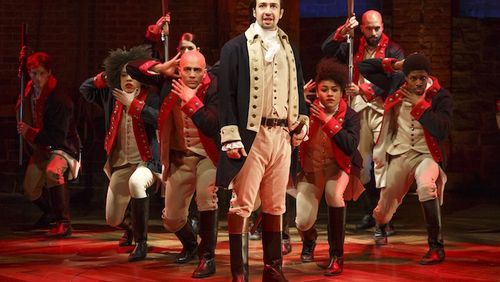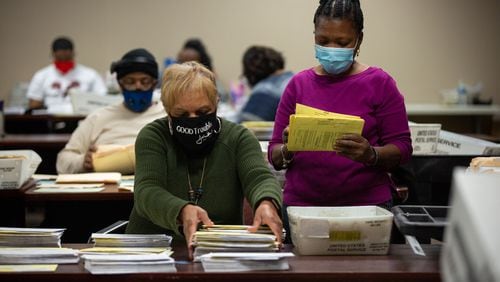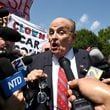Certified genius Lin-Manuel Miranda can now add a record-breaking number of Tony Award nominations to his crowded shelf of prizes and awards. The composer, writer and star of the Broadway mega-hit "Hamilton" -- who has a Pulitzer Prize, a Grammy Award, and a host of other drama and theater recognitions -- leads a musical that was nominated a historic 16 times, and could make history again in June when the awards are decided.
The nominations recognize the extraordinary talent and musical ingenuity -- yes, he won the MacArthur Foundation's "genius grant" fellowship last year -- of Miranda, whose stunning Broadway juggernaut is both a cultural and commercial sensation. It has attracted fans from Dick Cheney to The Roots' Questlove; President Barack Obama has hosted Miranda to perform at the White House several times and Michelle Obama called the musical "the best piece of art in any form I have ever seen in my life." Advance ticket sales are reported to be heading toward $100 million and the show is said to pull in an average $500,000 in profit per week.
In the process, Miranda has become not only one of Broadway's brightest artistic stars, but one of its real leaders. His groundbreaking musical, set to a hip hop and R&B score, featuring mostly black and Latino actors and strong female characters, is positioned to redefine the genre as we know it, changing casting, opening doors to more diverse actors, and rethinking how narrative and music can be combined in innovative ways.
He's also using his influence to advocate on current issues in Washington. Miranda's lobbying of Treasury Secretary Jack Lew - as well as the outcry from fans of the musical - are said to have played a role in Lew's decision to leave Hamilton on the $10 bill as he introduces new faces on U.S. currency. Meanwhile, Miranda, whose family immigrated from Puerto Rico, is lending his star power to back a Senate bill that would let Puerto Rico declare bankruptcy, easing its debt burden. (Miranda, recently rhyming on John Oliver's show "Last Week Tonight": "Paul Ryan I'll come sing 'Hamilton' at your house. I'll do-si-do with Pelosi, I'll wear my 'Hamilton' blouse. Your citizens are suffering, stop the bleeding stop the loss. Help Puerto Rico it's just a thousand miles across.")
But one of Miranda's most influential leadership acts may be the way he himself -- and his show -- embrace the idea of the power of legacy. Many leaders run from it, say they don't worry about it, act blasé about how history will treat them. Hamilton, meanwhile -- the Founding Father, the show and its creator -- are obsessed by it, and say so.
Ron Chernow, the Hamilton biographer whose book inspired Miranda to write the musical, has called that obsession part of the "dramatic essence" of the first Treasury Secretary's character. Major themes from the show deal with who owns the historical narrative, how everyone should feel they have a stake in their country, and what role legacy plays in telling our collective history. The closing song is titled "'Who Lives, Who Dies, Who Tells Your Story."
As Miranda told the New York Times last summer, "Who tells our story? Will it be told? We have no way of knowing. In essence, that's what the show is about." He said it's not only a question for the musical's characters, but one for the audience, who witnesses what Hamilton -- the "bastard orphan son of a whore and a Scotsman," as the show's rhyme goes -- ended up achieving with his own.
But Miranda doesn't force questions on people he doesn't ask of himself. "I think I've been worried about legacy since I was a kid," he told Time after it named him to its 100 Most Influential People list this year. "We have this amount of time. It's the tiniest grain of sand of time we're allowed on this earth, and what do we leave behind? I think that question has gnawed at me as long as I've been conscious. That's something that Hamilton outright states in our show, and I think that's something I share with him."
He believes that's one of the reasons the show has resonated with so many people. "When we're faced with what Hamilton got done in his life," he told Time, "it feels like three lifetimes' worth. Everyone who leaves the theater goes 'Wow. Well, what am I doing with my life? What is my legacy?' "
That question, of course, is one leaders should embrace - not only in trying to make an impact themselves, but by encouraging others to do the same. Lin-Manuel Miranda is making an indelible imprint on musical theater, challenging expectations of who we see on a stage and how the stories presented there are told. But he's also making a powerful imprint on the people who see it, leading them to think more about what they do with their lives, and who will tell those stories in the future.






